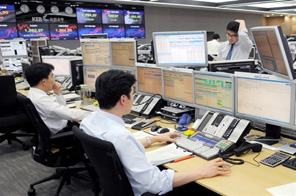SKorea declares downturn over with rate freeze
SEOUL: South Korea's central bank Thursday froze its key interest rate for the fourth straight month, saying the country's economic downturn has ended.
At its monthly policy meeting, the Bank of Korea (BOK) left the benchmark seven-day repo rate unchanged at a record low of 2 percent.
The bank had made six consecutive rate cuts totalling 3.25 percentage points between October and February to prop up the export-dominated economy as overseas markets shrank.
Recent business indicators show the domestic economic downturn has ended, but it is unlikely to recover quickly due to the global slowdown, central bank governor Lee Seong-Tae told a press conference.
It was too early to be sure of continued growth in the economy, he said.
In an earlier statement the bank said the slump in domestic demand had moderated and production activities had improved.
"The downside risk to economic growth, however, is thought to persist because of a rise in international raw material prices and the slowdown in major advanced countries."
Inflation has been moderating due to easing demand stemming from a slowing economy and gains in the won against the dollar, the statement said.
In April parliament approved a record 28.9-trillion-won (22.8 billion dollar) extra budget to create jobs and boost domestic demand. The additional budget followed earlier stimulus spending by the government.
The central bank is likely to leave the key rate unchanged for the rest of the year despite rising concerns over worldwide inflation, said Daishin Economic Research Institute economist Kim Yoon-Gi.
Kim told Dow Jones Newswires that "as a rise in raw material prices will be temporary and the global economy won't recover that fast, the BOK won't touch its base rate until the year-end."
South Korea narrowly avoided falling into recession in the January-March quarter, when the economy grew 0.1 percent quarter-on-quarter following a 5.1 percent contraction from October to December.
The BOK has predicted negative growth of 2.4 percent for Asia's fourth largest economy this year in what would be its worst performance for 11 years. It sees growth of 3.5 percent next year.






